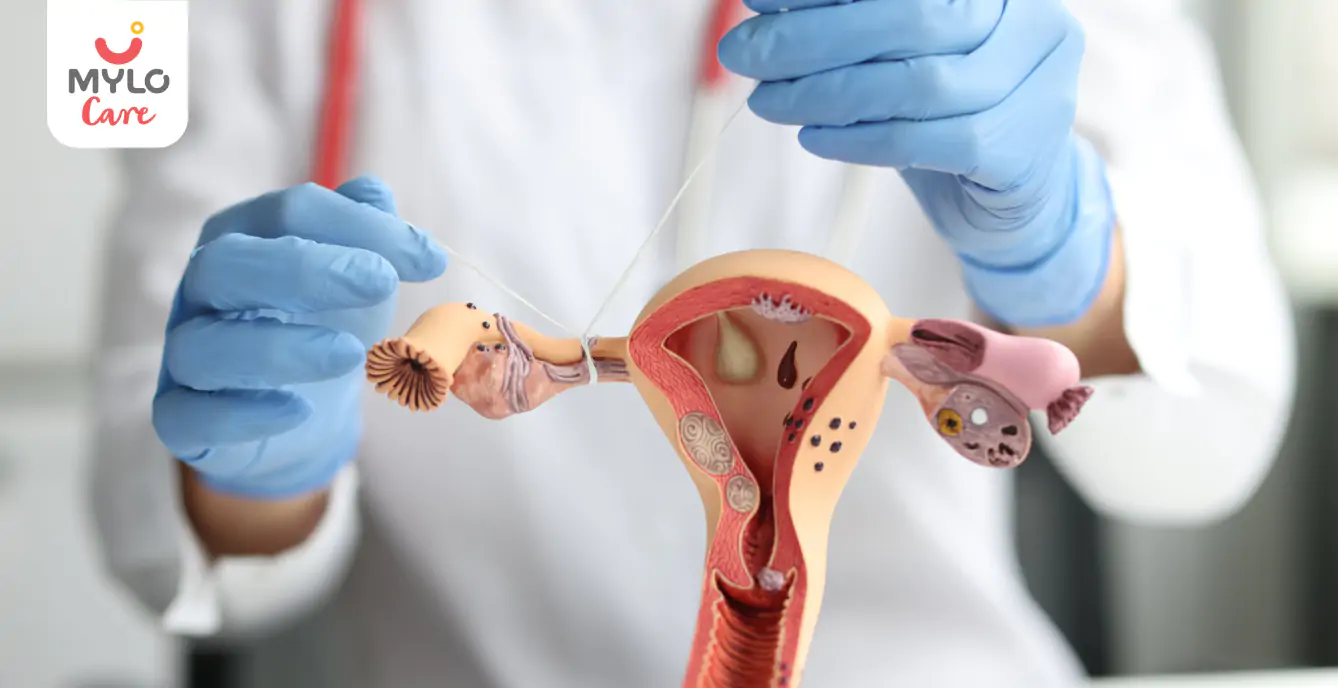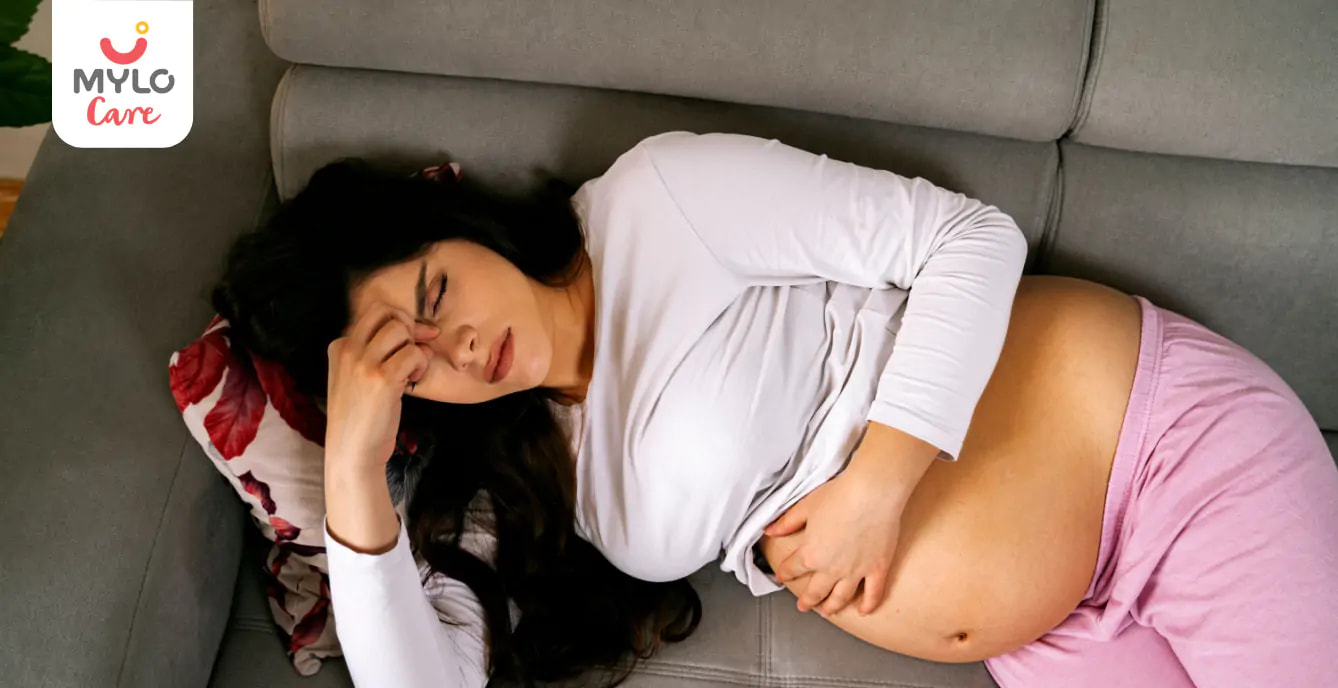Home

Headaches

Headache During Pregnancy: The Ultimate Guide to Causes and Cures
In this Article

Headaches
Headache During Pregnancy: The Ultimate Guide to Causes and Cures
Updated on 15 February 2024
Are you experiencing those pesky headaches that seem to have made themselves comfortable during your pregnancy? Don't worry, you're not alone! Headache during pregnancy is a common issue, with most women experiencing relief in the second and third trimesters. However, around 10% may experience worsening symptoms.
In this article, we will understand the common culprits causing those head-pounders to the best ways to find relief without putting your little one at risk.
Is Headache Common in Pregnancy?
The answer is a resounding yes. Headaches affect approximately 39-85% of pregnant women. This prevalence can be attributed to the hormonal changes, increased blood volume, and other physiological factors that occur during pregnancy.
Types of Headaches During Pregnancy
Not all headaches are created equal, and the same goes for those experienced during pregnancy. There are several types of headaches that pregnant women may encounter. The most common types include:
1. Tension headaches
Tension headaches are characterized by a dull, constant ache that may feel like a tight band around the head.
2. Migraines
Migraines, on the other hand, are usually more severe and can be accompanied by symptoms such as nausea, vomiting, and sensitivity to light and sound.
3. Sinus headaches
Sinus headaches are often caused by sinus congestion and inflammation and are typically felt as a deep, throbbing pain in the forehead, cheeks, or bridge of the nose.
You may also like: Pain in Anus During Pregnancy: Causes, Symptoms & Treatments
What are the Causes of Headache in Pregnancy?
Understanding the reason for headache during pregnancy is crucial in finding effective relief. Here are 7 common culprits behind those throbbing temples:
1. Hormonal Changes
Fluctuations in hormone levels, particularly an increase in estrogen, can trigger headaches in pregnant women.
2. Increased Blood Volume
During pregnancy, a woman's blood volume increases to support the growing fetus. This can lead to changes in blood flow and pressure, resulting in headaches.
3. Dehydration
Pregnant women need to stay hydrated to support the baby's development. Dehydration can cause headaches, so it's essential to drink enough water throughout the day.
4. Lack of Sleep
Pregnancy often brings discomfort and changes in sleep patterns. Insufficient sleep can contribute to headaches.
5. Stress and Tension
Pregnancy can be a stressful time, and stress and tension are known triggers for headaches.
6. Caffeine Withdrawal
Many pregnant women reduce their caffeine intake for the health of their baby. However, abrupt caffeine withdrawal can lead to headaches.
7. Sinus Congestion
Pregnancy hormones can cause nasal congestion, leading to sinus headaches.
You may also like: Back Pain During Period: Understanding the Causes and Solutions
Treatments for Headache During Pregnancy
Suffering from headaches during pregnancy doesn't mean you have to endure the pain. There are several safe and effective treatments that can bring relief. Here are 7 options to consider:
1. Rest and Relaxation
Taking time to rest and relax in a quiet, dark room can help alleviate headache symptoms.
2. Hydration
Drinking plenty of water throughout the day can help prevent and relieve headaches caused by dehydration.
3. Cold or Warm Compress
Applying a cold or warm compress to the forehead or back of the neck can provide soothing relief.
4. Gentle Exercise
Engaging in gentle exercises, such as prenatal yoga or walking, can help relieve tension and reduce headaches.
5. Acupuncture
Acupuncture, a traditional Chinese medicine practice, has been shown to be safe and effective in treating headaches during pregnancy.
6. Massage
Gentle prenatal massage from a certified therapist can help reduce muscle tension and alleviate headaches.
7. Medications
In some cases, your healthcare provider may recommend safe medications to alleviate severe headaches during pregnancy. It is important to consult with your healthcare provider before taking any medication.
You may also like: Tailbone Pain During Pregnancy: Stretches To Reduce Pain
FAQ’S
1. Is It Common to Have Headache During Early Pregnancy?
Experiencing headache during early pregnancy is not uncommon. The hormonal changes that occur during this time can trigger headaches in some women. Additionally, factors such as stress, lack of sleep, and changes in blood volume can also contribute to headaches during early pregnancy.
2. Is It Safe to Take Headache Medicine During Pregnancy?
Pregnant women are often cautious about taking any medication during pregnancy, and rightfully so. When it comes to headache medicine, it is important to consult with your healthcare provider before taking any over-the-counter or prescription medications. Some headache medications, such as ibuprofen, should be avoided during pregnancy, while others may be deemed safe by your healthcare provider.
3. What Causes Headaches During Pregnancy Second Trimester?
Headaches in pregnancy second trimester can have various causes. One common reason for headache during pregnancy is the increase in blood volume and changes in blood flow that occur during this stage. Hormonal fluctuations, stress, and tension can also contribute to headaches during the second trimester. Additionally, sinus congestion and dehydration can continue to be factors that trigger headaches during this time.
4. How to Reduce Headache During Pregnancy?
While it may not be possible to completely eliminate headaches during pregnancy, there are steps you can take to reduce their frequency and intensity. Maintaining a regular sleep schedule, staying hydrated, exercising regularly, applying cold or warm compresses and avoiding triggers like bright lights, loud noises and strong odors can help alleviate headaches during pregnancy.
The Bottomline
Headache during pregnancy is a common occurrence, but it doesn't have to be a constant source of discomfort. By understanding the causes and implementing effective treatments, pregnant women can find relief from headaches and enjoy a more comfortable pregnancy journey.
References
1. Schoen JC, Campbell RL, Sadosty AT. (2015). Headache in pregnancy: an approach to emergency department evaluation and management.
2. Negro A, Delaruelle Z, Ivanova TA, Khan S, Ornello R, Raffaelli B, Terrin A, Reuter U. (2017). European Headache Federation School of Advanced Studies (EHF-SAS). Headache and pregnancy: a systematic review.
3. Saldanha IJ, Roth JL, Chen KK, et al. (2020). Management of Primary Headaches in Pregnancy. Rockville (MD): Agency for Healthcare Research and Quality (US)
4. Zimmermann JSM, Fousse M, Juhasz-Böss I, Radosa JC, Solomayer EF, Mühl-Benninghaus R. (2023). Neurologic Consultations and Headache during Pregnancy and in Puerperium: A Retrospective Chart Review. J Clin Med.



Written by
Anandita Sharma
Drawing on more than a decade of expertise in administration, Anandita Sharma currently serves as a content operations e
Read MoreGet baby's diet chart, and growth tips

Related Articles
Related Topics
RECENTLY PUBLISHED ARTICLES
our most recent articles

Scans & Tests
Fetal Doppler Scan During Pregnancy: In which week should you get it done?

Sleep
How Long Should Naps Be While Pregnant?

Fertility Problems
Blocked Fallopian Tubes: How They Affect Your Chances of Conceiving

How Do You Notify Your Employer That You Are Pregnant?

The Ultimate Guide to Consuming Tapioca During Pregnancy

Braxton Hicks
Braxton Hicks Contractions or Real Labor: How to Tell Them Apart?
- Top 10 Tips For The Third Trimester Of Your Pregnancy
- Maternity Leave 101: Rules, Benefits & Timings for Expectant Working Women
- The A-Z Guide to Identifying Summer Vegetables for Kids
- Christian Baby Girl Names That Stand the Test of Time
- The A-Z Guide on Purple Colour Fruits and Vegetables for Kids
- The A-Z Guide on Red Colour Fruits & Red Colour Vegetables for Kids
- The A-Z Guide on Yellow Fruits & Yellow Colour Vegetables for Kids
- Cervical Cancer: Causes, Symptoms & Prevention
- The A-Z Guide to Identifying Stem Vegetables for Kids
- Can Fetal Heartbeat Disappear and Reappear?
- The Ultimate Guide to Teaching Children 20 to 30 Tables
- GK Questions for Kids from Nursery to Class 6
- Height and Weight Chart for Boys and Girls in India
- The A-Z Guide to Identifying Winter Vegetables for Kids


AWARDS AND RECOGNITION

Mylo wins Forbes D2C Disruptor award

Mylo wins The Economic Times Promising Brands 2022
AS SEEN IN
















- Mylo Care: Effective and science-backed personal care and wellness solutions for a joyful you.
- Mylo Baby: Science-backed, gentle and effective personal care & hygiene range for your little one.
- Mylo Community: Trusted and empathetic community of 10mn+ parents and experts.
Product Categories
baby carrier | baby soap | baby wipes | stretch marks cream | baby cream | baby shampoo | baby massage oil | baby hair oil | stretch marks oil | baby body wash | baby powder | baby lotion | diaper rash cream | newborn diapers | teether | baby kajal | baby diapers | cloth diapers |








